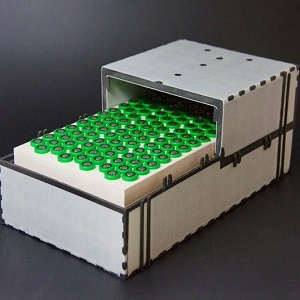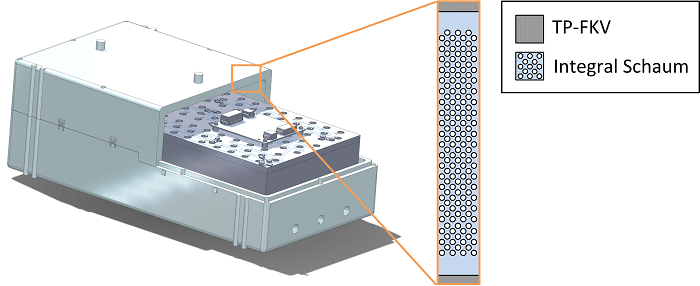Mar 20 2019
In times of impending bans for diesel and generally internal combustion engine (ICE) vehicles, battery electric vehicles (BEVs) are becoming increasingly interesting for buyers, especially in urban environments. Boosting battery capacities enable longer travels, however driving range of EVs varies especially at low ambient temperatures.

Complex, Functionally Integrated CFRTP Sandwich Components
Within the EU project “OPTEMUS” (Optimized Energy Management and Use), a large number of efficiency-enhancing technologies were therefore developed and holistically linked, in particular to reduce the range variation of a Fiat 500e EV.
The focus is on a novel sandwich battery housing made of continuous fiber reinforced thermoplastics (CFRTP), which helps to insulate stored heat in the traction battery for preconditioning. Fraunhofer LBF presented its research results at the JEC trade fair
A hybrid in-situ process developed at Fraunhofer LBF enables the production of complex, functionally integrated CFRTP sandwich components in cost sensitive high volume applications.
Battery module housing consisting of a thermally insulating polymer foam (black) covered with continuous fiber reinforced (CFRTP) facesheets, manufactured using a hybrid in-situ process in only 2 minutes.

This includes a traction battery with thermal storage capacity, which the Fraunhofer Institute for Structural Durability and System Reliability LBF has developed with partners.
Precondition Temperature-Sensitive Battery Cells
The heat storage material developed by Fraunhofer LBF can be used to precondition the temperature-sensitive battery cells in cold weather before the ride and to keep them at an optimum operating temperature using the thermally insulating CFRTP sandwich housing. An active temperature control can thus often be avoided. Conversely, it is possible to mitigate short-term, unwanted heat increases of the battery, which may arise during fast charging.
“The material, structure and process technologies we have developed guarantee the driver a more reliable and consistent range of his BEV. In addition, vehicle developers and designers benefit from a new process technology for lightweight construction and functional integration", explains Felix Weidmann, who was responsible for the research project at the Fraunhofer LBF.
Mechanical and Thermal Requirements
- Mechanical and thermal requirements are provided by the novel CFRTP battery housing.
- This is composed by a sandwich structure based on UD tape facesheets (UDMAX™, SABIC) covering an integral polymer foam core. While the foam core provides thermal insulation, the facesheets bear most of the loads.
- For this purpose, LBF scientists consolidated UD tapes into a cross composite which was preformed into three dimensional (3D) composite facesheets.
- Between these 3D facesheets, the polymer foam core is injection moulded using a novel hybrid in-situ manufacturing process.
- The resulting sandwich construction has several advantages: It offers high lightweight potential and enables high specific bending properties and impact resistance.
- In addition, it provides a high level of protection against intrusion events, which play a major safety role especially in battery packs.
In order to meet automotive requirements, the material and structure concept has been developed with respect to high volume applications.